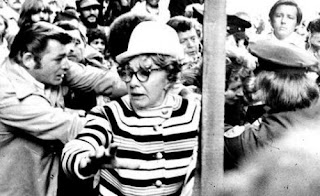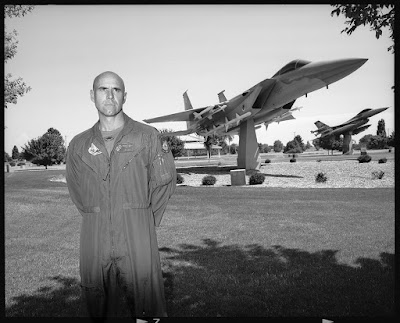To recap: gay characters in mainstream pop culture, especially in geek culture, are generally either psychopathic villains or buffoonish clowns who provide comic relief. These tropes have become so entrenched that many audience members react strongly and negatively when challenged with LGBT characters in other roles.
And especially when it comes to gay male heroes: all the stereotypes about gay male effeminacy and mental disorder tend to fuel misguided assumptions that homosexuality--and especially homosexuality in men--is incongruent with the kind of charismatic heroism that central protagonist roles usually demand. I believe that this is a big part of the resistance to Poe being gay: audiences just can't reconcile a gay male heroic character with societal stereotypes of gay men as sissies and wimps.
So I thought it was worth a little primer (or reminder) on a few real-life gay men who challenged the poisonous misconceptions that homosexuality somehow prevents a man from cutting a heroic figure. This is just a tiny sample of gay men whose high-profile selfless acts of heroism saved lives--often at the expense of their own.
 |
Sipple (left) saves the life of Pres. Ford by
grabbing Sarah Jane Moore |
Oliver Sipple was a gay man who served as a Marine in the Vietnam War. On September 22, 1975, Sipple thwarted an assassination attempt of President Gerald Ford in San Francisco by grabbing the arm of the would-be assassin, Sara Jane Moore, as she raised her gun to fire. The bullet missed the President and struck an innocent bystander, who suffered only minor wounds. Sipple was declared a hero for his bravery and quick action.
Unfortunately, this unwanted fame thrust him into a spotlight that outed him to his family and society, leaving him alienated and embittered until his death in 1989. But Harvey Milk, a San Francisco city supervisor and the first openly gay elected official in the U.S., knew Sipple and wanted people to know that Sipple was gay. Milk is quoted as saying,
"For once we can show that gays do heroic things."
Staff Sergeant Eric Alva was the first American Marine to be wounded in Iraq in 2003, and the Iraq War's first recipient of the Purple Heart. On the first day of Operation Iraqi Freedom, Alva stepped on a landmine and sustained injuries that required amputation of his leg.
After his injury, Alva worked to improve the opportunities of other gay people who wanted to serve, and he became a spokesperson against the U.S. military's "Don't Ask Don't Tell" policy until it was finally repealed in 2011. Alva is quoted as saying:
"I joined the military because I wanted to serve. I was patriotic, idealistic; I was also gay."
....Hm. Latino, patriotic, idealistic, gay. He reminds me of someone... I can't quite put my finger on it... Oh, and if you're having a hard time imagining what a dashing, decorated, gay military fighter pilot might look like in real life, behold:
Lt. Col. Victor Fehrenbach.
 |
| Not so bad, right? |
 Allan Fonseca
Allan Fonseca was a Macy's employee who was working the day of the Clackamas, Oregon mall shooting in 2012. When Fonseca heard the gunfire, he led a customer out of the store, then had the stones
to go back in--TWICE--to help more customers and coworkers evacuate.
So gay heroes are not just soldiers. They're civilians too. And sometimes they have gorgeous skin and work at the Lancome counter.
Deal with it.
Tori Johnson was another civilian hero that helped others survive a crazed gunman in Sydney in December 2014. The gunman took a dozen people hostage in a cafe and used them as human shields during an hours-long standoff with authorities.
Eventually, Johnson, a gay man and the manager of the cafe, charged the gunman and tried to wrestle away the weapon. Johnson was fatally shot, but his selfless actions distracted the gunman long enough for the others to escape, and the gunfire brought in the police, who killed the gunman. The entire country of Australia remembers him as a hero.
The horrible events of September 11, 2001, marked some of our country's darkest hours. But on that terrible day, the heroism of emergency responders and of everyday people inspired the country and captured our imaginations. Two of the most widely-known heroes of September 11 were gay men.
Father Mychal Judge, known as the Saint of 9/11, was a Franciscan Chaplain to the New York Fire Department and had the dubious honor of being the first victim of the September 11 terrorist attacks when he was killed by falling debris. His heroism and bravery at the World Trade Center were extraordinary, but
his full story as an out, gay, recovering alcoholic Irish-Catholic priest is nothing short of legendary. Judge's spirit, kindness, and charisma touched hundreds, if not thousands, of lives. His was a terrible loss, but like all heroes, he made his sacrifice with courage and selflessness and he was a credit to all Americans.
Mark Bingham was an entrepreneur, a skilled rugby player, and a gay man from the Bay Area who found himself on board United Flight 93 en route to San Francisco on September 11. When the flight was hijacked, Bingham was one of the passengers who stormed the cockpit to prevent the terrorists from completing their attack, sacrificing themselves in the ensuing crash to save countless other lives. His and the other Flight 93 passengers' stirring tale of heroism is memorialized in numerous
films and documentaries. Bingham is remembered by the Bay Area and the broader gay community as one of the largest-looming heroes of 9/11.
These men (and countless other LGBT people, men and women alike) are exactly the type of hero that has never--
ever--been portrayed in a sci fi or action film as a main protagonist, even though their heroics capture the selflessness and bravery that we all admire in a character like Poe.
And the next time someone scoffs at the idea of Poe (or any central protagonist) being LGBT, with the implication that someone as heroic, charismatic, and virtuous as Poe couldn't possibly be gay, keep these men and their stories in mind.






 Throw in a bunch of the Deadpool dancers, Chris Pratt being gracious and adorable accepting an award for the action sequence in Jurassic World, and a pantsless Alexander Skarsgard, and it was a spectacle that was right up my gay fanboy alley. The recognition for The Force Awakens as the fans' pick for the year's Best Movie was a crowning moment for this awards season.
Throw in a bunch of the Deadpool dancers, Chris Pratt being gracious and adorable accepting an award for the action sequence in Jurassic World, and a pantsless Alexander Skarsgard, and it was a spectacle that was right up my gay fanboy alley. The recognition for The Force Awakens as the fans' pick for the year's Best Movie was a crowning moment for this awards season.


 Allan Fonseca was a Macy's employee who was working the day of the Clackamas, Oregon mall shooting in 2012. When Fonseca heard the gunfire, he led a customer out of the store, then had the stones to go back in--TWICE--to help more customers and coworkers evacuate.
Allan Fonseca was a Macy's employee who was working the day of the Clackamas, Oregon mall shooting in 2012. When Fonseca heard the gunfire, he led a customer out of the store, then had the stones to go back in--TWICE--to help more customers and coworkers evacuate.



